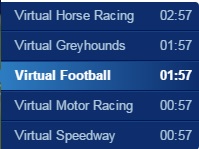One of the most surprising, and welcome, statistics I read last year, was a report into the state of the sports betting industry in the UK which revealed that after the traditional betting hotbeds of soccer and horse racing, Virtual Sports were the third biggest generator of revenue for sports betting sites out of all their other betting attractions.
the state of the sports betting industry in the UK which revealed that after the traditional betting hotbeds of soccer and horse racing, Virtual Sports were the third biggest generator of revenue for sports betting sites out of all their other betting attractions.
While Virtual Sports betting still trails way behind the big two in terms of betting revenue, it does mean that more money is wagered on Virtual Sports than on sports such as cricket, darts, snooker, basketball, tennis, golf or rugby.
This represents a remarkable rise in popularity for Virtual Sports since it was first introduced a few years ago and yet, there is an argument that Virtual Sports is so very different to sports betting in its purest form, that it perhaps should not be as popular as it is.
Now of course, any sports punter will understand that betting on Virtual Sports is not the same as placing a bet on a real-life sporting event. You can’t research your Virtual Sports bet in the same way you can two teams competing in football, or the runners in a horse race. You can’t go back and look at previous form, check out how the teams have performed in their most recent games or even view historic data between the two protagonists of your chosen Virtual Sport.
However, that doesn’t seem to matter to punters who have welcomed Virtual Sports with open arms and embraced the different types of bets available within it. So the question we are going to ask is why? Why, given that Virtual Sports is so different to standard betting, why has it enjoyed such a massive growth in popularity with punters in a relatively short space of time?
The answers to that question are numerous and we will explore the key reasons for Virtual Sports popularity below.
- Accessibility
While there are sporting events on around the world at most times of the day, if you want to bet on something specific, such as a horse race or a football match, you have to be available at that time in order to bet and then watch the outcome.
With Virtual Sports being available 24/7 and each event being very similar to the last, the fact that you can play the game at any time of the day and still enjoy the same experience and options as other players playing at different times, does make this a positive.
- Time it takes to play
There is no doubt that the time element has been one of the foundations of Virtual  Sports success over the last few years. Even short sporting events, such as a greyhound race or horse race, when you include the period in between a race, can last between 30 and 45 minutes usually. Soccer matches usually last 90 minutes, and if you bet on Test Cricket, then you have five days to wait for the result.
Sports success over the last few years. Even short sporting events, such as a greyhound race or horse race, when you include the period in between a race, can last between 30 and 45 minutes usually. Soccer matches usually last 90 minutes, and if you bet on Test Cricket, then you have five days to wait for the result.
That of course does not include those bets which are based on the outcome of a competition. Back a team to win the Premier League in August and you have to wait until May the following year to discover if your bet was a winner or not.
With Virtual Sports, there is none of that waiting around for an event to finish. Each event takes between 3 and 5 minutes to complete, including the time you have to place your bets, which means that if you have limited time, Virtual Sports is perhaps the best type of betting option for you.
- No need for research
If you are a serious sports betting enthusiast, then it is likely that you will carefully  research your bets before you place them. This part of sports betting is one of the most or least enjoyable aspects of the hobby, depending on your point of view, but it can pay dividends for you, especially if you are keen on ante-post betting and like to place bets months in advance of an event.
research your bets before you place them. This part of sports betting is one of the most or least enjoyable aspects of the hobby, depending on your point of view, but it can pay dividends for you, especially if you are keen on ante-post betting and like to place bets months in advance of an event.
However, in Virtual Sports, there is no history of a participating individual or team that you can research, so you are betting blind in many cases with only the odds to guide you. Some sports betting enthusiasts may find that a concern, but for many to not be at a disadvantage compared to those who religiously research their bets is a positive boon.
- Additional appeal for slots/casino game players
While there has not been any official research into this that I can locate, I am confident that the way that Virtual Sports has been set up to run means that in addition to appealing to sports betting enthusiasts, there are a large number of players of casino games and slots that also find Virtual Sports appealing.
We have already mentioned in past articles that Virtual Sports shares many similarities to a slot in that it is powered by a random number generator and as such, this appeals to this particular type of punter who doesn’t want to have to think a great deal about their bets, just pick a selection and then see what happens.
The faster pace of Virtual Sports too will also appeal to casino and slot gamers who get the result of their deal or spin at a much faster pace than a person who indulges in traditional sports betting does.
- Most popular forms of betting available
There’s no doubt that Virtual Sports are more simplistic than their real life  counterparts and while for some punters that may not be a good thing, for others it is a boon as Virtual Sports focuses on the markets that they are more likely to want to bet on.
counterparts and while for some punters that may not be a good thing, for others it is a boon as Virtual Sports focuses on the markets that they are more likely to want to bet on.
In terms of race-based Virtual Sports, most bets tend to be either on a selection to win, an each way bet for them to place, or a Forecast or Tricast bet (if available) on the finishing order. You can of course, combine selections across different Virtual Sports events into an accumulator too if you so wish.
Even though this is a small number of bets, it does tend to cover the vast majority of bets people want to make on these sports. The same is true in football or tennis Virtual Sports, which tend to have a focus on just the most popular bets you can make in these games.
This stripped back approach to Virtual Sports betting is a good thing as it allows users to focus quickly on the markets and make decisions quickly about who to back, which in turn allows Virtual Sport to run at a faster pace.
- “Human error” removed from the result process
One of the most frustrating aspects of sports betting can be thoroughly researching a market or a bet you want to make and then making your bet. Then sitting back and watching the event unfold, only for either a competitor or an official to make a mistake, which ensures your bet will lose and which you could not have possibly foreseen.
A good example of this can be when a referee administers a red card to a player on a team you backed, or a player you backed to be the first goalscorer in a game. It could be a driver making a mistake in a race and seeing his car crash into that of the driver you had backed to win a race. Whatever the scenario, it can be frustrating to see your bet lose in this way.
In Virtual Sports though, these ‘human errors’ are not part of the game, so your bet on a team winning a match is not going to be influenced by a player receiving a red card in the first half of a game. This in turn makes Virtual Sports, even with its random number generator at the heart of the game, more predictable at times than real life sports, which is a positive for any punter.
Virtual Sports has been a huge success since its release and in truth, as we head into 2019 and beyond, that success looks only set to continue in the future.
